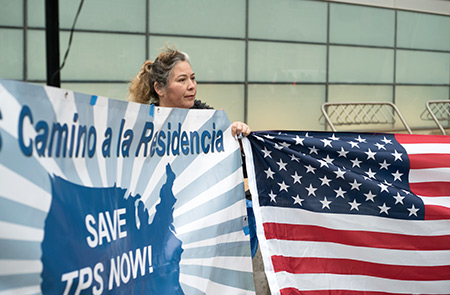The Trump administration on Monday ended a three-decade program that provided temporary protection to more than 200,000 Salvadoran immigrants who built lives in the United States after fleeing civil war, earthquakes and hurricanes. They have until September 2019 to either become permanent U.S. residents or face deportation.
The decision to terminate Temporary Protected Status for El Salvador was made “after a review of the disaster-related conditions upon which the country’s original designation was based and an assessment of whether those originating conditions continue to exist as required by statute,” Secretary of Homeland Security Kirstjen M. Nielsen said in a statement (en Español). She said that based on “careful consideration of available information, including recommendations received as part of an inter-agency consultation process … the original conditions caused by the 2001 earthquakes no longer exist.”
Two major quakes rocked the country in January and February 2001. The first was a magnitude 7.6, and killed nearly 1,000 people, injured 8,000, and destroyed more than 108,000 homes. An additional 170,000 houses and more than 150,000 other buildings were damaged. A month later, a separate, magnitude 6.6 quake killed more than 300 people, injured at least 3,400, destroyed 45,000 homes and damaged 17,000 others.
“Many reconstruction projects have now been completed. Schools and hospitals damaged by the earthquakes have been reconstructed and repaired, homes have been rebuilt, and money has been provided for water and sanitation and to repair earthquake damaged roads and other infrastructure,” Nielsen said. She also noted that the U.S. government “has been repatriating individuals back to El Salvador — more than 39,000 in the last two years — demonstrating that the temporary inability of El Salvador to adequately return their nationals after the earthquake has been addressed.”
Nielsen said that her department had “conducted extensive outreach to Salvadoran communities throughout the country,” and that she had spoken recently with President Sánchez Cerén, and met with the Salvadoran foreign minister and U.S. ambassador.
Contrary Evaluation in 2016
In July 2016, the Obama administration made a different assessment of conditions in El Salvador.
“The earthquakes caused significant damage to transportation infrastructure, housing, education and health services, small and medium businesses, and the environment,” Homeland Security concluded in justifying an extension until March 2018. “Recovery from the earthquakes has been slow and encumbered by subsequent natural disasters and environmental challenges, including hurricanes and tropical storms, heavy rains and flooding, volcanic and seismic activity, an ongoing coffee rust epidemic, and a prolonged regional drought that is impacting food security. … Increasing violence and insecurity is also a major constraint to economic growth.”
El Salvador has the largest number of TPS beneficiaries — 262,528 as of October, the government says — among 10 currently designated countries, accounting for 60 percent of the nearly 437,000 people covered. Of the total Salvadorans, about 195,000 had re-registered for an extension by fall. Their average time in the United States is 22 years. More than 90 percent are legally employed, and about one third are homeowners.
Since 1990, migrants from 22 nations have been granted temporary protection to live and work in the United States. They must re-register every 18 months.
Homeland Security announced late last year that it was ending TPS for about 65,000 nationals of Haiti, Nicaragua and Sudan. It also postponed a final decision on about 86,000 Hondurans, the second largest group, until June. About 50,000 Haitians were granted a 6-month extension last July; it expires Jan. 22. The agency has until the end of the month to decide whether to terminate or extend protection for nearly 7,000 Syrians.
See: Central Americans Tense as U.S. Ends Temporary Protection for Some Migrants
The impact extends beyond those directly losing their protected status. Salvadoran TPS holders are parents to an estimated 190,000 U.S.-born children, and thousands have married U.S. citizens. Businesses also will be affected if TPS holders do not “adjust” their legal status to become permanent residents before the 2019 deadline.
Salvadoran and others must re-register for TPS and apply for employment authorization to continue to work legally. Protections for Salvadorans were initially scheduled to expire in early March.
Nielsen’s statement concluded by stating that only Congress could “legislate a permanent solution” and that the 18-month delay offered a window to craft a resolution. At least four bills had been introduced before Monday’s announcement.
Immigrant advocates assailed the decision and said they would lobby Congress for a permanent solution.
“We are devastated by this decision but we will continue to fight and will find permanent solutions, said Martha Arevalo, executive director of the Central American Resource Center in Los Angeles, where 30,000 TPS holders live. “We will now make it even clearer to members of Congress, Republican and Democrat alike, that this government needs to take responsibility for its failed immigration and foreign policies towards El Salvador that for many years have caused violence and instability in El Salvador. We urge Congress to pass legislation with a pathway to Legal Permanent Residency for TPS holders.”
Democrats Call It ‘Shameful and Wrong’
Two top Democrats denounced the Trump administration’s decision as “shameful and wrong,” noting that El Salvador for years “has been gripped in a crisis of extreme violence,” especially against women.
“El Salvador has among the highest murder rates in the world, including one of the highest rates of femicide. In 2015, a woman was murdered every 16 hours in El Salvador,” said Reps. Zoe Lofgren of San Jose, the ranking Democrat on the House Immigration and Border Security Subcommittee, and Jerrold Nadler of New York, the ranking member on the Judiciary Committee. “Further compounding the sense of fear generated by these murders is the inability of the Salvadoran government to hold persecutors accountable. From 2010 to 2013, 95 percent of murders in the region were unsolved or unprosecuted. “
President Donald Trump “may appease his base with this decision, but the continued degradation of our humanitarian immigration policies will have long-lasting impact” on the nation’s success and prosperity,” their statement said, claiming the action would cost the U.S. economy $31 billion over 10 years.
“Much like the decision to end the Deferred Action for Childhood Arrivals (DACA) program, today’s TPS announcement is an indication that the Trump Administration’s grievances extend to all immigrants, including those with legal work authorization,” Lofgren and Nadler said. “It is clear this Administration’s only immigration policy priority is mass deportation.”
California has an estimated 55,000 TPS holders, with the biggest concentrations of Salvadorans and other Central Americans in the Los Angeles area, according to U.S. Census-based research by the Center for Migration Studies.
The U.S. Citizenship and Immigration Services could not provide detailed local data or say how many TPS holders have secured full legal status. “We don’t have a business need to know how many people from a particular city have been granted TPS,” said Sharon Rummery, a public affairs officer in San Francisco.
Advising Local Community on Options
The Central American Resource Center in the Mision District is advising the TPS community about its options. Executive Director Lariza Cuadra said that thousands of TPS recipients have changed their legal status over several years. She estimated that San Francisco has been home to 10,000 to 15,000 TPS recipients. Since 1996, she said, her Mission District office has processed an average of 600 TPS renewals every 18 months. The numbers have decreased steadily, in part because many adjusted their status through citizenship, residency, spousal petitions and other methods.
The current TPS crisis is only the most recent episode in a saga that for some has kept them in the limbo of temporary status for decades.
In the 1980s, hundreds of thousands Guatemalans, Nicaraguans and Salvadorans fled civil wars, death squads and other civil catastrophes. The majority of the more than one million migrants seeking refuge came to California, primarily Los Angeles and San Francisco — the latter arguably the primary center of political advocacy for Central American refugees in those days.
Those seeking political asylum were greeted with almost constant rejection by the Reagan administration — 98 percent of Guatemalan asylum claims and 97 percent of Salvadoran asylum claims. The administration politicized the process by rejecting people fleeing rightist U.S. allies while giving preferential treatment to Nicaraguan nationals fleeing the leftist Sandinista government.
The organizing leading to Temporary Protected Status began shortly after Salvadorans arrived in San Francisco, the first major hub of organizing for that community, in 1980. It was in full swing by 1983, when their efforts led 89 members of Congress to sign a letter requesting that the State Department and the U.S. attorney general grant “extended voluntary departure” to Salvadorans fleeing the war.
The Central American Resource Center and other groups were also the first to secure sanctuary city status in San Francisco and Los Angeles to protect refugees from El Salvador and Guatemala from being handed over to immigration by local police, hospitals and other municipal agencies. San Francisco courts ruled favorably in lawsuits brought by advocates seeking fairer adjudication of asylum claims. Together, these and other efforts resulted in Congress granting the first TPS to Salvadorans in 1990. The program, which was signed into law by President George H.W. Bush, was later extended to other groups.
Between 1980 and 1990, the Salvadoran immigrant population in the United States swelled from 94,000 to 465,000, according to the MigrationPolicy Institute. More than half of all Salvadoran immigrants live in California and Texas, with concentrations in New York, Maryland, Virginia, and the District of Columbia.










